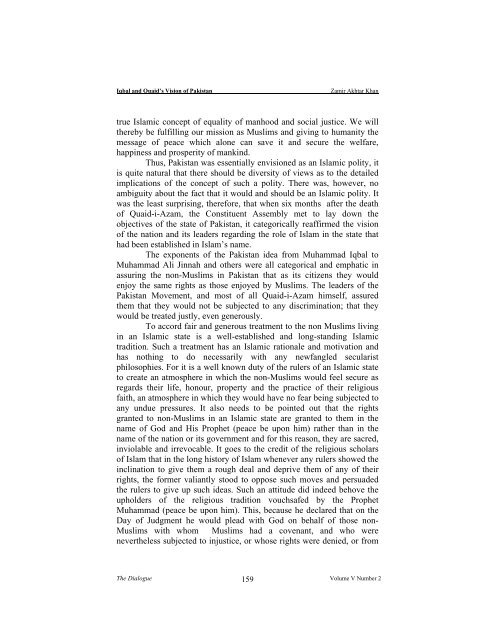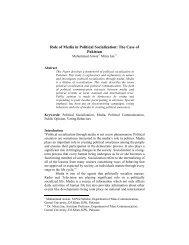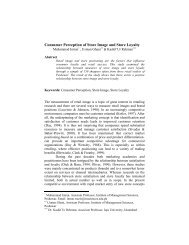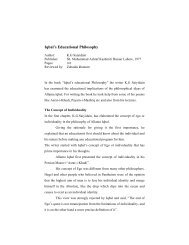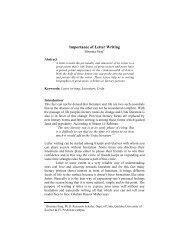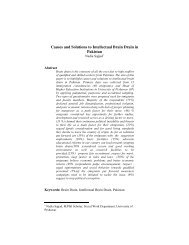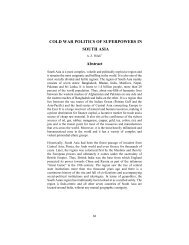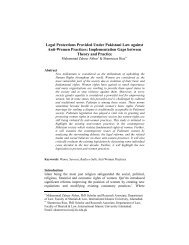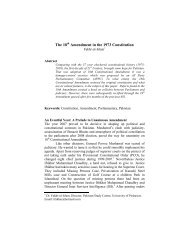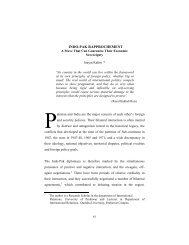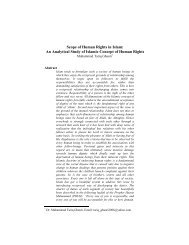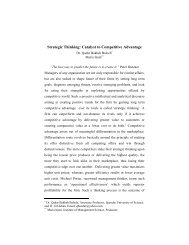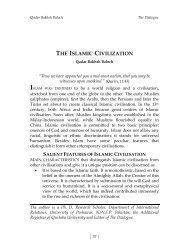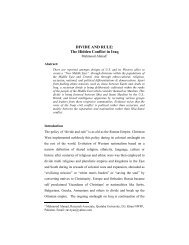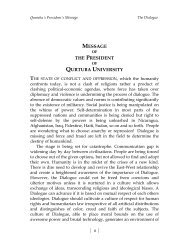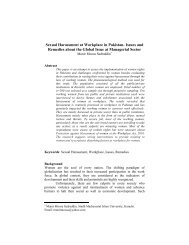Iqbal and Quaid's Vision of Pakistan - Qurtuba University of Science ...
Iqbal and Quaid's Vision of Pakistan - Qurtuba University of Science ...
Iqbal and Quaid's Vision of Pakistan - Qurtuba University of Science ...
You also want an ePaper? Increase the reach of your titles
YUMPU automatically turns print PDFs into web optimized ePapers that Google loves.
<strong>Iqbal</strong> <strong>and</strong> Quaid’s <strong>Vision</strong> <strong>of</strong> <strong>Pakistan</strong> Zamir Akhtar Khan<br />
true Islamic concept <strong>of</strong> equality <strong>of</strong> manhood <strong>and</strong> social justice. We will<br />
thereby be fulfilling our mission as Muslims <strong>and</strong> giving to humanity the<br />
message <strong>of</strong> peace which alone can save it <strong>and</strong> secure the welfare,<br />
happiness <strong>and</strong> prosperity <strong>of</strong> mankind.<br />
Thus, <strong>Pakistan</strong> was essentially envisioned as an Islamic polity, it<br />
is quite natural that there should be diversity <strong>of</strong> views as to the detailed<br />
implications <strong>of</strong> the concept <strong>of</strong> such a polity. There was, however, no<br />
ambiguity about the fact that it would <strong>and</strong> should be an Islamic polity. It<br />
was the least surprising, therefore, that when six months after the death<br />
<strong>of</strong> Quaid-i-Azam, the Constituent Assembly met to lay down the<br />
objectives <strong>of</strong> the state <strong>of</strong> <strong>Pakistan</strong>, it categorically reaffirmed the vision<br />
<strong>of</strong> the nation <strong>and</strong> its leaders regarding the role <strong>of</strong> Islam in the state that<br />
had been established in Islam’s name.<br />
The exponents <strong>of</strong> the <strong>Pakistan</strong> idea from Muhammad <strong>Iqbal</strong> to<br />
Muhammad Ali Jinnah <strong>and</strong> others were all categorical <strong>and</strong> emphatic in<br />
assuring the non-Muslims in <strong>Pakistan</strong> that as its citizens they would<br />
enjoy the same rights as those enjoyed by Muslims. The leaders <strong>of</strong> the<br />
<strong>Pakistan</strong> Movement, <strong>and</strong> most <strong>of</strong> all Quaid-i-Azam himself, assured<br />
them that they would not be subjected to any discrimination; that they<br />
would be treated justly, even generously.<br />
To accord fair <strong>and</strong> generous treatment to the non Muslims living<br />
in an Islamic state is a well-established <strong>and</strong> long-st<strong>and</strong>ing Islamic<br />
tradition. Such a treatment has an Islamic rationale <strong>and</strong> motivation <strong>and</strong><br />
has nothing to do necessarily with any newfangled secularist<br />
philosophies. For it is a well known duty <strong>of</strong> the rulers <strong>of</strong> an Islamic state<br />
to create an atmosphere in which the non-Muslims would feel secure as<br />
regards their life, honour, property <strong>and</strong> the practice <strong>of</strong> their religious<br />
faith, an atmosphere in which they would have no fear being subjected to<br />
any undue pressures. It also needs to be pointed out that the rights<br />
granted to non-Muslims in an Islamic state are granted to them in the<br />
name <strong>of</strong> God <strong>and</strong> His Prophet (peace be upon him) rather than in the<br />
name <strong>of</strong> the nation or its government <strong>and</strong> for this reason, they are sacred,<br />
inviolable <strong>and</strong> irrevocable. It goes to the credit <strong>of</strong> the religious scholars<br />
<strong>of</strong> Islam that in the long history <strong>of</strong> Islam whenever any rulers showed the<br />
inclination to give them a rough deal <strong>and</strong> deprive them <strong>of</strong> any <strong>of</strong> their<br />
rights, the former valiantly stood to oppose such moves <strong>and</strong> persuaded<br />
the rulers to give up such ideas. Such an attitude did indeed behove the<br />
upholders <strong>of</strong> the religious tradition vouchsafed by the Prophet<br />
Muhammad (peace be upon him). This, because he declared that on the<br />
Day <strong>of</strong> Judgment he would plead with God on behalf <strong>of</strong> those non-<br />
Muslims with whom Muslims had a covenant, <strong>and</strong> who were<br />
nevertheless subjected to injustice, or whose rights were denied, or from<br />
The Dialogue 159<br />
Volume V Number 2


